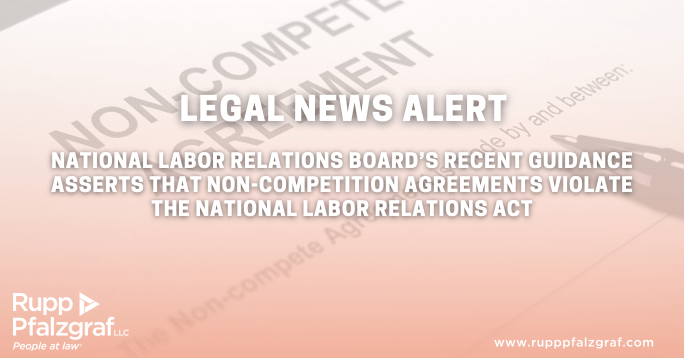
Legal News Alert: National Labor Relations Board’s Recent Guidance Asserts that Non-Competition Agreements Violate the National Labor Relations Act.
Written By: Pia Perfetto
On May 30, 2023, the Office of the General Counsel (“General Counsel”) for the National Labor Relations Board (“NLRB”) issued a memorandum (“Memorandum”) regarding the legality and enforceability of non-competition agreements. Non-competition agreements restrict an employee’s ability to work for a competitor or in a related industry following termination of the employment relationship. Employers utilize non-competition agreements to safeguard their business relationships, client lists, and other confidential data and trade secrets from competitors.
Therein the Memorandum, the General Counsel disputes the legality of non-competition agreements and asserts that contracts which prevent private-sector employees from accepting certain jobs and operating certain types of businesses after the end of their employment may violate Sections 7 and 8(a)(1) of the National Labor Relations Act (“NLRA”).
Section 7 of the NLRA states that “employees shall have the right to self-organization, to form, join, or assist labor organizations, to bargain collectively through representatives of their own choosing, and to engage in other concerted activities for the purpose of collective bargaining or other mutual aid or protection, and shall also have the right to refrain from any or all of such activities.” Section 8 of the NLRA makes it an unfair labor practice to interfere with the rights guaranteed in Section 7.
The General Counsel contends that non-competition provisions are overbroad because “the provisions could reasonably be construed by employees to deny them the ability to quit or change jobs by cutting off their access” to new employment.
The NLRB joins several states, the District of Columbia, and the Federal Trade Commission in advocating for employers to suspend their use of non-competition agreements. While the Memorandum is not legally binding, it evidences the General Counsel’s position that non-competition agreements may constitute an unfair labor practice, “unless it [the provision] is narrowly tailored to address special circumstances justifying the infringement on employee rights.”
The Memorandum guides the NLRB’s regional staff and directors to investigate, prioritize and submit cases concerning non-competition agreements. Accordingly, “[i]n appropriate circumstances, [r]egions should seek make-whole relief for employees who, because of their employer’s unlawful maintenance of an overbroad non-compete provision, can demonstrate that they lost opportunities for other employment, even absent additional conduct by the employer to enforce the provision.” Seemingly, employees may be compensated with back pay and benefits even if the employer did not enforce the non-competition agreement against the employee.
If you have questions regarding enforceability of a non-competition agreement, please contact Rupp Pfalzgraf LLC at 716-854-3400.

